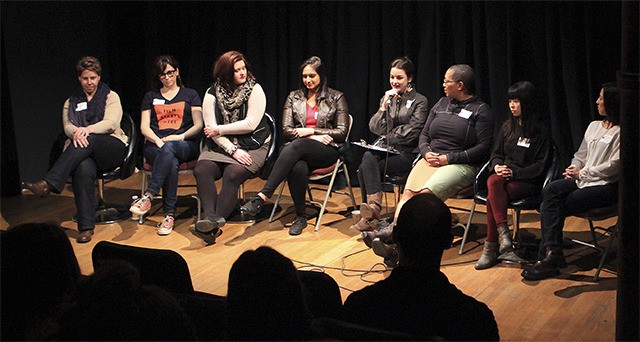Mount Si High School teacher Joe Dockery is fighting for girls’ future in the film industry; as a call-to-action, he organized the inaugural Puget Sound All Girls Film Challenge screening, networking event, April 30 at the Northwest Film Forum, in Seattle.
The conference brought Puget Sound high-school girls face-to-face with their peers and more than 12 professional women representing Adobe Youth Voices, Reel Girls, the National Film Festival for Talented Youth, the Northwest Film Forum and independent production company founders. The girls were given a chance to submit films for critiques and develop their networking skills; Julia Juarez-Kostelnik of Shorewood High School earned the Award of Excellence.
“Part of the whole idea of doing the film challenge and then organizing the conference was to encourage girls to take classes like this and a chance for them to work together,” Dockery stated, amid the buzz of his sixth-period digital media arts class, part of the district’s career and technical education, or CTE, offerings.
With educational tech awards from media giants and major corporations like Adobe and Radioshack in his repertoire, Dockery sends his students on adventures armed with innovative, often grant-funded technology, like the school’s drone quadcopters, to document newsworthy Valley events.
Besides championing a tech-progressive syllabus and giving easy access to pricey video equipment, he’s joined the continuous battle for industry gender equality.
“I realized that we need to be more and more aggressive at trying to balance gender equality in this classroom,” he said, adding the growth he’s seen in his 15 years teaching at the high school is not enough.
Participating schools included Mount Si and Twin Falls, Oak Harbor High School, The Center School, Crosspoint and Shorewood High School.
Dockery brought five of his students to the conference, while his fellow tech champion Jana Mabry of Twin Falls Middle School, who had a significant part in brainstorming the event, brought nine girls from her Tech Team, who have all participated in her video technology class.
“Joe and I have a goal of recruiting, mentoring and empowering more girls and young women into technology of all types,” Mabry wrote in an e-mail, “and providing them opportunities to see others, like themselves, in those positions and to help them network with each other for support. We are building relationships between our programs with this as one of the goals, not excluding the boys in our programs.”
Two of Dockery’s students who attended the conference were 11th grader Holly Dafler and 10th grader Emily Creed; they shared their thoughts about the inaugural event.
“It was really cool because there were so many professional women in this field,” Creed began, “and a lot of them were giving out their personal e-mails and stuff to us. It was also inspirational because they were like telling you how to do things and don’t set limits for yourself…
“I came up with some ideas while I was there, like, ‘Oh, I could make a video about this, or this!’ while I was watching other films; it inspired me.”
“One thing I learned is, because the film industry is a very male-dominated industry, don’t be afraid to be a little pigheaded and don’t be afraid to push for what you want,” Dafler mused.
One of those professional advocates was Courtney Sheehan, program director at the Northwest Film Forum.
“Middle and high school is such a formative time for developing professional interests, aspirations, and even just finding ideas to later explore,” Sheehan wrote in an e-mail. “Connecting with working professionals in a conference setting is an invaluable opportunity for young women to seek mentorship and to simply be exposed to possibilities and identify who they might aspire to be like.
“It’s important to convey to young women entering any profession, but especially the white-male-dominated film industry, that they needn’t be silent in the face of sexism,” she continued. “Women can support and embolden each other… This conference represented an important active step toward dismantling the traditional structures that have inhibited women’s professional opportunities in the industry.”
During the conference, the girls workshopped themes for 2016’s video competition. They developed three: Oh the places you’ll go…; walls and barriers; and struggle is real.
The film must be two to four minutes long, filmed and produced by only young women (18 years old, max) and include an original or public domain licensed soundtrack. The deadline is midnight, Dec. 18, and the all-women jury will include Puget Sound school alumni and media professionals.
Dockery hopes the 2016 conference participation will grow from six to 50 schools, but that’s something that starts in the classroom.
“Last year, I got five or six girls in my class,” he said. “It got to the point where they could form their own groups (and) they came up with these creative projects. I wanted to continue that (and) to make sure girls had a chance to work with themselves and get their voices out there.”

Jeremy and Jemely Jayme, former Oak Harbor students who founded Deadwringer Productions in Seattle, judged the films and networked with the girls.

